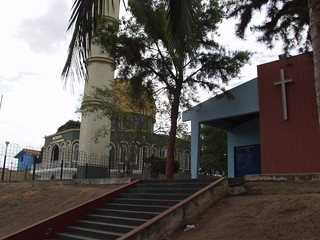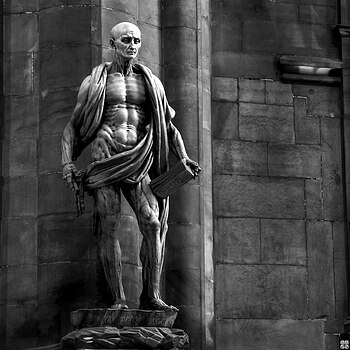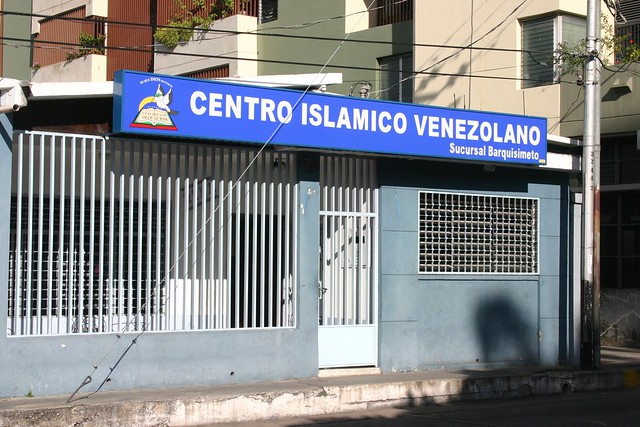| Duomo di Milano St. Bartholomew San Bartolomeo by Marco D'Agrate (Photo credit: Wikipedia) |
How fitting that,
after weeks of the Internet flooded with images of crucified,
beheaded, imprisoned and otherwise persecuted Christians in Iraq,
Syria, Nigeria and Sudan, we remembered in our worship the apostle
who is said to have been skinned alive and beheaded.
August 24 is
designated on the church calendar as a day of commemoration for St.Bartholomew. It is perhaps rather odd that Bartholomew should have
his own day, just like Peter, Paul and the four evangelists, when he
never wrote any of the New Testament books, and his friend, Philip,
shares a day of commemoration with St. James (May 1).
Bartholomew is one
of the most obscure of the 12 apostles. The three Synoptic Gospels
(Matthew, Mark and Luke) and the book of Acts list him as one of the
twelve, but give us no more information about him, other than that he
was a witness like the rest to the Lord's death, resurrection and
ascension. The Gospel of John does not list the 12 apostles and does
not mention anyone named Bartholomew, but in John 1:43-51 we find the
story of someone called Nathanael being called as a disciple of
Jesus. There are reasons to believe Nathanael and Bartholomew are the
same person:
- Nathanael is described as a friend of Philip. In the roster of the apostles, several of the 12 are grouped in pairs because of their strong personal ties. For example, Peter and Andrew, who were brothers. Likewise, James and John were both the sons of Zebedee. Bartholomew is paired with Philip.
- Nathanael is a given name, while Bartholomew is a surname. In Aramaic, “bar” means “son” (as in Simon bar-Jonah) and Bartholomew is a form of “Bar-Tolmai” or “son of Tolmai”). So the apostle's full name was Nathanael bar-Tolmai.
- John's account of the calling of Nathanael follows his account of the calling of Peter, Andrew and Philip as apostles. Later, in John 21, Nathanael is named along with the apostles Peter, James and John as witnesses of the third appearance of the risen Christ.
According to later,
post-biblical histories, Bartholomew traveled on missionary journeys
to Iraq, Turkey, Armenia and perhaps as far east as India. He is said
to have been martyred in Armenia on the shores of the Caspian Sea.
You can read my St. Bartholomew's sermon here.
Bartholomew's story
should remind us that, although in the first century such atrocities
were not recorded and uploaded to the Internet, the more things
change, the more some things remain the same. Christians in many
parts of the world today are still faced with the choice of
renouncing their faith or suffering a cruel death.
We may understand
persecution
from a biblical perspective as any manifestation of hostility
from authorities, individuals or crowds that result directly from
one's identification as a Christian. Persecution in the Bible
manifests itself within a broad spectrum of actions ranging from
ridicule, restriction of liberties, certain kinds of harassment, or
discrimination on one end of the spectrum to torture, imprisonment,
ostracism, or killing on the other (see Matthew 6:11-12, Luke 6:22; 2
Corinthians 11:23-29; James 1:2). “Nor is all persecution a
violation of our basic rights as a human being. To be despised,
hated, and ridiculed is not a violation of one's rights, as
unpleasant and unjust as these things are,” said the late Glenn
Penner of Voice of the Martyrs Canada.
Nevertheless, we
Christians who enjoy a high degree of religious liberty should not
forget those who endure more severe forms of persecution, including
violations of basic human rights. We should continue to pray for them
and try to help them. Here
is what Lutheran Hour
Ministries is doing to aid Christians in Syria and Iraq. The
Lutheran Church – Missouri Synod
has established a Fund
to Aid Christians Under Persecution, primarily in countries where
the LCMS does not have an international mission presence through
official missionaries and other LCMS or partner church personnel.
Donations made to the fund will be bundled into one or more grants
that will be disbursed through appropriate nonprofit human-care and
relief agencies.
We are not isolated here from the conflicts of the Middle East. There is a small, but growing and influential Muslim influence in Venezuela. The Mosque Ibrahim Ibin Abdul Aziz Al-Ibrahim in Caracas is the second-largest mosque in Latin America after the King Fahd Islamic Cultural Center in Buenos Aires. Built in 1989, its minaret towers 113 meters high, the highest in Latin America, higher than the steeple of the Roman Catholic Cathedral of Caracas, only a few blocks away.
The minaret and dome of Mosque Al Khulafa al Rashideen in San Felix de Guayana, Venezuela, completely overpower, in terms of physical presence, Ascension Lutheran Church, which is right next door was built years before the mosque. The church is one of the largest congregations in the Lutheran Church of Venezuela. A building which once was a branch office of "Cristo Para Todas Las Naciones" (the Spanish Lutheran Hour) in Barquisimeto, the fourth-largest city in Venezuela, is now an Islamic center.
 On the other hand,
there are Middle Eastern Christians who have fled violence in their
homelands for Venezuela. San Charbel Church in Caracas is the product
of an earlier era of persecution. Maronite Christians oppressed by
the Ottoman Empire fled their native Lebanon for Venezuela in the
latter half of the 19th Century. Maronites are said to be the
descendants of ancient Phoenicians who converted to Christianity
thanks to the preaching of a Syrian monk known as St. Maron in the
fourth century after Christ. The Syriac Maronite Church of Antioch
today is an "Eastern Catholic" church. That is to say it
acknowledges the authority of the Pope, but is allowed its own
liturgies and practices distinct from what western Europeans know as
Roman Catholicism.
On the other hand,
there are Middle Eastern Christians who have fled violence in their
homelands for Venezuela. San Charbel Church in Caracas is the product
of an earlier era of persecution. Maronite Christians oppressed by
the Ottoman Empire fled their native Lebanon for Venezuela in the
latter half of the 19th Century. Maronites are said to be the
descendants of ancient Phoenicians who converted to Christianity
thanks to the preaching of a Syrian monk known as St. Maron in the
fourth century after Christ. The Syriac Maronite Church of Antioch
today is an "Eastern Catholic" church. That is to say it
acknowledges the authority of the Pope, but is allowed its own
liturgies and practices distinct from what western Europeans know as
Roman Catholicism.
The Cathedral of St.George is a Melkite Greek Catholic church in Caracas. Once found
mainly in Syria and Lebanon, Melkite Christians have become dispersed
throughout the world thanks to persecution in their ancestral lands.
Melkite Christians trace their history back to the ancient
patriarchates of Antioch, Alexandria (Egypt) and Jerusalem. The
Melkite Greek Catholic Church today also is an "Eastern
Catholic" church.
So Venezuelan Jews
have felt the most intense repercussions of events abroad. Venezuela
once had one of the oldest and most stable Jewish populations in
South America. Venezuela
was the country on the South American mainland closest to the island
of Curaçao where a flourishing community of Spanish-Portuguese
Jews. As early as the 1600s, Jews from Curaçao traded with
Venezuela, helped by their knowledge of the Spanish language, the
ownership of ships, and the favorable location of Curaçao. Jews used
to exchange manufactured goods for tobacco, hides, coffee, corn,
powdered gold, and cocoa.
After Venezuela won
independence from Spain, Simon Bolivar invited the Curaçao Jews to
settle there and help the development of the newly independent state.
Starting in 1821, Spanish-Portuguese Jews started to settle in
various Venezuelan cities, namely, Barcelona, Caracas, Carabobo,
Barquisimiento, Maracaibo, and Puerto Cabello. The main Jewish
settlement was in Coro, some 35 miles (60 km) from Curaçao.
Today, however, is
a rising tide of anti-Semitism, due at least indirectly to the
current government's alliances with Iran and other anti-Israel
factions in the Middle East. In 2007, government
troops raided a Jewish school in Caracas, ostensibly searching
for hidden weapons. On the night of Jan. 31, 2009, a dozen
unidentified men broke into the Gran Sinagoga Tiféret Israel, the
oldest standing synagogue in Caracas. The assailants bound and gagged
security guards, entered the sanctuary, ripped open the ark, and
splayed its silver-tinged contents out across the floor like
leftovers from a bad night drinking. Then they rifled through
administrative files, apparently stealing nothing, and spray-painted
“DEATH NOW,” “OUT, OUT,” “ISRAEL MALDITOS,” and a horned
devil with 666 in red on the walls.
Many Jews have fled
the country. According to the Confederation of Jewish Associations of
Venezuela (CAIV),
the number of Venezuelan
Jews
dwindled
from about 18,000 in 2000 to 9,000 in 2010.
As Christians, we
believe that the civil government has the authority to maintain order
in a fallen world by restraining the acts of evildoers by force of
arms. However, the civil government has no jurisdiction over human
souls, that is to say, it cannot tell people what to believe or think
about God. Therefore the right of religious liberty applies to people
of all creeds. We also should realize that in modern times,
persecution
of Jews usually is a prelude to persecution of Christians and
that all
countries that persecute Christians also persecute Jews.
Lord God, revealed
in Christ as the One whose foolishness is wiser than men and whose
weakness is stronger than men;
Help those who
suffer for the sake of the truth to find Your strength in their
weakness, to see Your glory in what is despised, to feel Your
presence in what is desolate.
Help them to
understand that in Your gentleness there is power, that in Your grace
there is strength, that in Your forgiveness there is life.
Relieve them from
torture and pain, from the strain of their emotions, from temptation,
danger and agony of soul.
Use their suffering
for the conversion of those who torment them, for the strengthening
of those who love them, for the welfare of Your people everywhere.
Keep them in Your
steadfast love in Christ, our Lord, for His sake. Amen.





No comments:
Post a Comment